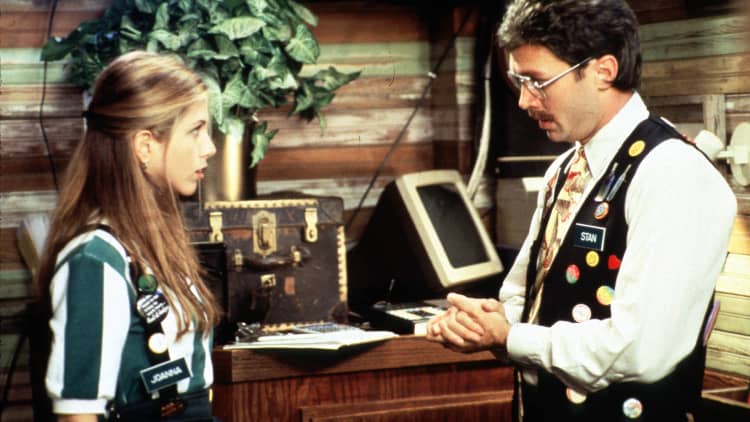The horrible job. We've all had one.
The one that has you dreading Monday as early as Sunday morning. The one that has you plotting dramatic "I quit" scenarios while you're taking your morning shower. The one that has you asking yourself "What am I doing here?" every few days.
The worst part is feeling stuck. Maybe you can't find another job. Maybe you're not even sure where to look. You fear your fate is sealed forever.
More from Student Loan Hero:
6 best banks to refinance and consolidate student loans in 2017
Top lenders to consolidate and refinance parent PLUS loans
How to lower your student loan interest rates
The good news is many people have been in your shoes and managed to escape. Want proof? Below are six stories of people who not only quit their jobs but also ended up earning more. Here's how they did it.
It might be time to leave when you wish for a sick day …
Sometimes a job isn't bad; it's just the wrong thing for you. Or it was the right thing until stagnation kicked in.
That's what happened to freelance writer and content strategist Kayla Albert. After working in the same role for several years in her hometown of Denver, she realized it was time to move on.
"One Monday morning, I woke up hoping I was sick just so I wouldn't have to go into the office," Albert said. "That's when it became clear I needed to make a change."
Luckily, she was already doing freelance work on the side, so she began to focus more of her energy there in order to plan a transition.
"I wanted to have close to one year's salary saved before making the leap," she said. "It helped ease my mind as much as possible."
Albert decided she'd be able to save enough to quit in three months, which the freelance work helped her do. And it didn't take up so much of her time that she couldn't have a life. Between her full-time work and freelancing, she was clocking a reasonable 45 to 47 hours per week.
She also told her network outside her immediate workplace about the upcoming change. This move is not only a good idea for building new clients; it also can help you follow through on your plans. Albert's network helped her stay on track and remain strong.
For aspiring solopreneurs, Albert suggested a focus on preparation.
"Start planning now," she said. "Even if you think tackling your dream is five years into the future, setting aside the money now will allow you to take the leap when you know it's time instead of muscling through a not-so-great work situation."
It's been more than a year since Albert took the leap, and she's already outpaced her previous salary by eight to 10 percent. Even better, she works 25 hours per week instead of 40. For someone seeking a better work-life balance, it's the ultimate gain.

Another strategy that helped Albert was opening a business checking account so she could keep her business earnings separate and pay herself a salary. This move made it easier to budget the way she did when she had a full-time job. And the budgeting is even better now that her income is on the rise.
… or when work is taking over your life
Speaking of muscling through a not-so-great work situation, what happens if your job is taking over your life? When this happened to financial writer Kali Hawlk, she knew it was time to leave.
"Your work is clearly important — but it shouldn't run your life," she said. "And it certainly shouldn't make you miserable ALL the time."
Hawlk practices what she preaches in terms of taking risks for happiness. While she was working toward her goal of self-employment, she picked up her Southern roots and fulfilled her dream of moving to Boston.
Now she loves her work life and home life equally, as she's able to work for herself and then go out and enjoy her adopted city.
Hawlk's biggest focus as she made the transition was building her business to a reasonable size before taking the leap. Doing so provided some assurance that the business plan was sound and the success was replicable.
And all that extra work paid off when it led her to a big enough client base that she could go full time on her own.
"I wanted to earn at least twice as much from my own business as I earned from my job — to account for things like expenses, taxes, etc. — and I wanted to do that for at least three months in a row before I felt comfortable enough to go back out on my own," she said.
As Hawlk thinks about her progress from working full time to building a business of her own, she's pleased with how well things are going. She has not only fulfilled her dream of becoming her own boss, but she's also earning enough to do it in the city of her dreams.
Now that's turning an unhappy scenario into a win.
… or when you realize you have a chance at self-employment
Unhappiness is one reason to leave a job, but so is the moment you realize you might have what it takes to start your own venture. When Careful Cents owner Carrie Smith Nicholson had that realization, everything changed.
"I didn't set out to quit my job and be my own boss, but after spending two years with my blogging side hustle, I could see the potential to take it full time," she said.
Like Albert and Hawlk, Smith Nicholson wasn't going to leave before her finances were ready. She wanted to save $10,000 first — a number she came to after adding up her monthly expenses. But when she hit $8,000, a family member experienced a health issue that made her realize she was close enough. So she put in her notice.
Four years later, Smith Nicholson's business is booming. She's already doubled her previous income and is on track to triple it. What's more, she's turning her business success into a way to help others do the same. Her blog, which used to be focused on personal finance, now helps others achieve their entrepreneurial dreams.
By helping people achieve freedom from the cubicle, Smith Nicholson is living a life of happiness and giving.

But she encouraged those who want to do the same to be practical: "My advice is to have a solid business plan in place. How are you going to make money? Does this revenue model fit into the kind of lifestyle you want to create?"
If you don't answer those questions honestly, you might end up having to go back to a regular job. A little planning — both for the business and your finances — can go a long way to ensure the sustainability of your dream.
More ways you can prepare for becoming your own boss
It isn't easy to quit your job and start your own venture — and you might have a few sleepless nights before it all comes together. Here are a few things you can do to prepare yourself for what's ahead.
Get ready for some financial sacrifices
David Waring, father of two young children and founder of business review company Fit Small Business, quit his job as an executive selling institutional trading software to banks and hedge funds in 2011.
Waring now earns roughly 50 percent more with his own company than he did then as a sales executive.
But he knew it could take several years to reach success, so he built his business while working full time. He also saved up $40,000 and traded his Wall Street luxury apartment for a roommate and a walk-up in Harlem.
One key for David was not spending too much money at the beginning — a strategy that dovetailed with his frugal ways.

"I chose a great business partner," he explained. "We did not invest a lot of money initially and let the idea prove itself on its own merit. Once things started working, we invested most of the profit back into growing the business."
Grow your industry knowledge and your network
Lily Taban, founder of public relations consulting company Fig & First, used her knowledge and network to get a business off the ground.
Lily's first referral came through a friend and former co-worker who appreciated her experience and passion. And her business has grown on referrals ever since.
If you have a solid list of personal contacts in your industry, reaching out to them to build a client base can be a great way to start. But make sure you don't hedge your bets so much that you never take the plunge.
"I was always waiting to be 'ready,' and I would have lived my entire life waiting," she said. "There was always a fear or excuse holding me back from making the leap to work for myself."
Prepare yourself financially and professionally, but remember: At some point, you're going to have to leap.
Prepare to make some mistakes
One of the hardest parts of working for yourself is how much time you spend doing things besides the thing you earn money for.
Matthew Keesan, co-founder of Raaka Chocolate, learned that the hard way. Although he didn't want for clients in the beginning — he was able to turn the job he hated into a contract with the company he worked for, earning three times more — the pressures of operating a business were still there.
"I learned, painfully, how to run a business — managing cash flow, managing client expectations, ensuring I got paid on time, etc.," he said. "It was easy starting with a client who was my former employer who didn't want to see me go."
But in the end, he got his ultimate payoff.
"I've been fortunate to get to work in a variety of industries, from finance to hospitality to technology, but the sweetest work of all is being my own boss," he said.
Want to take your own leap? Start planning
It might be difficult to imagine quitting your job and then earning enough to double, triple, or even quadruple your income. But as you can see here, it's been done before, and it can be done again.
It all comes down to understanding how much money you'll need to earn, working on building a client base before you leap, and doing research on what it takes to run a business.
Want even more ideas? Check out this story for tips on how to turn a side gig into a full-fledged business.
Like this story? Like CNBC Make It on Facebook
Don't miss: In the 'Game of Thrones' episode 'Eastwatch,' Samwell Tarly shows when it's time to quit your job



